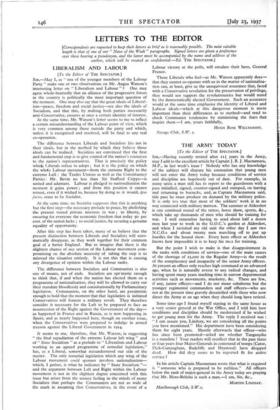LETTERS TO THE EDITOR
[Correspondents are requested to keep their letters as brief as is reasonably possible. The most suitable length is that of one of our " News of the Week " paragraphs. Signed letters are given a preference over those bearing a pseudonym, and the latter must be accompanied by the name and address of the author, which will be treated as confidential.—Ed. THE SPECTATOR.]
LIBERALISM AND LABOUR
[To the Editor of THE SPECTATOR.] Sut,—May I, as " one of the younger members of the Labour Party " make one or two observations on Mr. Angus Watson's interesting letter on " Liberalism and Labour " ? One may agree whole-heartedly that an alliance of the progressive forces in the country is politically the most important question of the moment. One may also say that the great ideals of Liberal- ism—peace, freedom and social justice—are also the ideals of Socialism, and that this, by making both parties necessarily anti-Conservative, ensures at once a certain identity of interest.
At the same time, Mr. Watson's letter seems to me to reflect a certain misunderstanding of the Labour point of view, which is very common among those outside the party and which, unless it is recognised and resolved, will be fatal to any real co-operation.
The difference between Liberals and Socialists lies not in their ideals, but in the method by which they believe those ideals can be realised. Socialists are convinced that the first and fundamental step is to give control of the nation's resources to the nation's representatives. That is precisely the policy whicii Liberals refuse to adopt ; but it is the policy on which the whale Labour movement—from the extreme Right to the extreme Left : the Trades Unions as well as the Constituency Parties : Mr. Bevin no less than Sir Stafford Cripps—is united and adamant. Labour is pledged to nationalisation the moment it gains power ; and from this position it cannot retreat, even if it wished to, because by doing so it would, ipso facto, cease to be Socialist.
At the same time, no Socialist supposes that this is anything but the first step—the necessary prelude to peace, by abolishing the present vested private interests in war ; to liberty, by ensuring for everyone the economic freedom that today 90 per cent. of the nation lacks ; to social justice, by securing a genuine equality of opportunity.
After this step has been taken, many of us believe that the present distinction between Liberals and Socialists will auto- matically disappear, as they work together for their common goal of a better England. But to imagine that there is the slightest chance of any section of the Labour movement com- promising on the absolute necessity of taking the step is to misread the situation entirely. It is not this that is causing any divergence of opinion within the Labour ranks.
The difference between Socialists and Communists is also one of means, not of ends. Socialists are opfmistic enough to think that, if and when the nation has elected them on a programme of nationalisation, they will be allowed to carry out their mandate bloodlessly and constitutionally by Parliamentary legislation. Communists, on the other hand, are pessimistic enough to hold that the moment that that legislation is initiated Conservatives will foment a military revolt. They therefore consider it necessary for the Left to be prepared to face an insurrection of the Right against the Government of the day— as happened in France ,and in Russia, as is now happening in Spain, and as nearly happened here, though on another issue, when the Conservatives were prepared to indulge in armed treason against the Liberal Government in 1914.
It seems to me, therefore, that Mr. Watson, in suggesting " the final repudiation of the extreme Labour left wing " and of " State Socialism " as a prelude to " Liberalism and Labour working to an agreed programme of remedial legislation," has, as a Liberal, somewhat misunderstood our side of the matter. The only remedial legislation which any wing of the Labour movement could sponsor involves nationalisation— which, I gather, is what he indicates by " State Socialism "- and the argument between Left and Right within the. Labour movement is not in the slightest degree concerned with this issue but arises from the uneasy feeling in the minds of many Socialists that perhaps the Communists are not .so wide of the mark in assuming that Conservatives, in the event of a Labour victory at the polls, will emulate their hero, General Franco.
Those Liberals who feel—as Mr. Watson apparently does— that theycannot co-operate with us in the matter of nationalisa- tion can, at least, give us the unequivocal assurance that, faced with a Conservative revolution for the preservation of privilege, they would not support the revolutionaries but would stand by the democratically elected Government. Such an assurance would at the same time emphasise the identity of Liberal and Labour ideals—which at this dangerous moment is more important than their differences as to method—and tend to check Communist tendencies by minimising the fears that inspire them.—I am, yours faithfully, HUGH Ross WILLIAMSON.
Savage Club, S.W. z.






























































 Previous page
Previous page